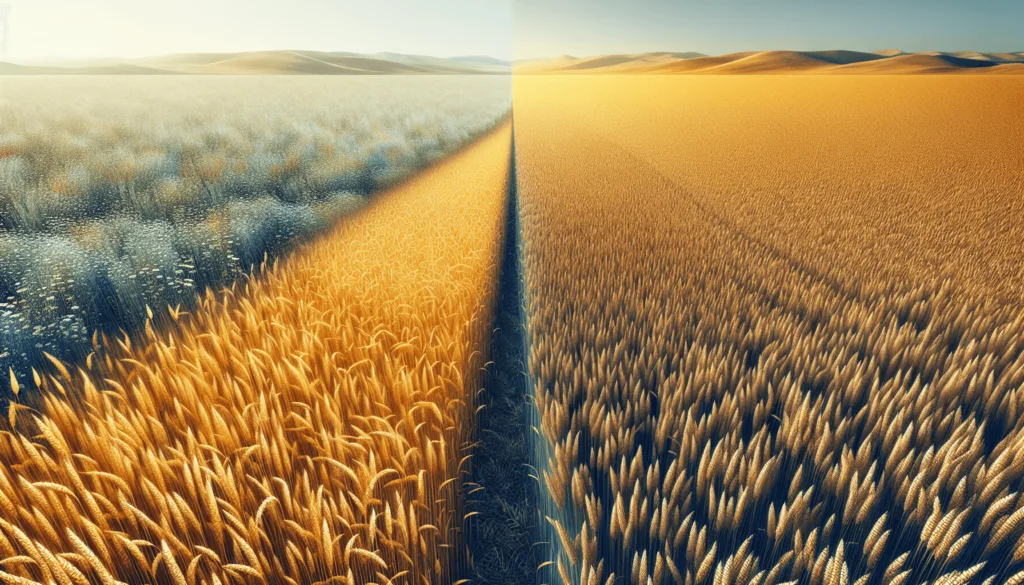Have you ever wandered down the baking aisle, gazing at the variety of flours, and wondered why ancient grains like Einkorn wheat are coming back? Whether you shop from this store online or prefer a traditional trip to your supermarket or farmers market, nutrition-packed grains are gaining popularity, especially among baking enthusiasts looking for something unique and wholesome. This article will explore the distinctions between Einkorn wheat and the modern wheat available in most supermarkets and why you might want to consider adding this ancient grain to your pantry.

Exploring Einkorn Wheat: The Ancient Super Grain
Einkorn wheat is the oldest form of cultivated wheat, tracing over 10,000 years. Its name, “single grain,” in German, highlights its simple genetic composition. This attribute makes Einkorn easier to digest for some individuals and a valuable source of nutrients, including protein, essential fatty acids, phosphorus, and vitamins. Einkorn wheat offers a richer, nuttier flavor than modern wheat, adding a distinctive, rustic touch to baked goods.
The unique nutritional profile of Einkorn wheat can be attributed to its untouched genetic composition. Unlike modern wheat, which has undergone extensive hybridization and modification, Einkorn has remained largely unchanged over millennia. This means the beneficial nutrients inherent to the grain, such as essential amino acids, minerals, and antioxidants, are preserved in their natural ratios. Einkorn’s lower gluten content also contributes to its easier digestibility for some people, making it an attractive alternative for those with gluten sensitivities.
Modern Wheat: Today’s Dietary Staple
Modern wheat has undergone significant breeding and modification to satisfy global food supply demands. These modifications have achieved a hardier and higher-yielding crop but with increased gluten content and reduced nutrient levels. In culinary applications, modern wheat flour is incredibly adaptable and suitable for various recipes, from soft bread to delicate pastries. However, its flavor is considerably milder than Einkorn and other ancient grains.
The widespread cultivation of modern wheat can be linked to its adaptability to various climates and high yields. These characteristics have made it a reliable and economical choice for farmers and food manufacturers worldwide. However, the genetic modifications that have led to these advantages have also resulted in a less nutrient-dense grain and higher gluten than its ancient counterparts. Despite these drawbacks, modern wheat remains a cornerstone of the global food supply, found in various products from bread and pasta to cookies and cakes.
Comparing the Two: Nutrients, Taste, and Sustainability
Side by side, Einkorn and modern wheat exhibit notable differences. Einkorn wheat stands out for its nutritional density in key minerals and vitamins. Its lower gluten content may benefit those with sensitivities, although it isn’t safe for individuals with celiac disease. Flavor-wise, Einkorn’s richer, nuttier profile can elevate traditional recipes. Einkorn also tends to be more sustainably farmed than conventional wheat, thriving with organic practices and less fertilizer.
Bringing Einkorn Wheat Home: A Nourishing Addition to Meals
Integrating Einkorn wheat into your home cooking offers an opportunity to experiment with both flavor and tradition. From pancakes to bread, substituting Einkorn for modern wheat in recipes can enhance the taste and nutritional value of your dishes. For families eager to diversify their diets and embrace ancient culinary practices, Einkorn is a compelling option.
Moving Towards Healthier Choices with Ancient Grains
Opting for Einkorn wheat over modern varieties represents a shift towards more sustainable, nutrient-rich eating habits. By incorporating a range of grains, particularly ancient ones, into our diets, we achieve a more comprehensive nutrient intake. Although finding the right grains may require venturing beyond your usual stores, the health and flavor advantages of ancient grains like Einkorn make the effort worthwhile.

Jessi is the creative mind behind The Coffee Mom, a popular blog that combines parenting advice, travel tips, and a love for all things Disney. As a trusted Disney influencer and passionate storyteller, Jessi’s authentic insights and relatable content resonate with readers worldwide.
